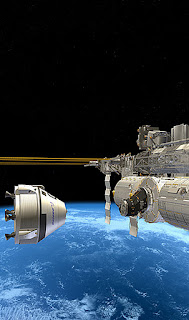"This positions our state well for future growth and a leadership role in NASA's next generation human space exploration initiatives. It is also a key factor in ensuring Florida's space-related economy continues to thrive after shuttle retirement."
Boeing is working with Space Florida on agreements to use Kennedy Space Center’s Orbiter Processing Facility Bay 3 (OPF-3) and Processing Control Center (PCC) facilities for Commercial Crew program execution. The OPF-3, previously used to perform maintenance on the space shuttle orbiters, features approximately 64,000 square feet of manufacturing and processing areas and about 64,000 square feet of office, laboratory and logistics areas. The PCC consists of approximately 99,000 square feet of control rooms and office space Boeing plans to use to support mission operations, training and program offices. The PCC previously supported shuttle orbiter testing, launch team training, and computer system software and hardware development and maintenance operations.
In partnership with Space Florida, Boeing plans to modernize the facilities to provide efficient production and testing operations that optimize the company’s best practices from satellite manufacturing, space launch vehicles and commercial airplane production programs.
The Commercial Crew program consists of developing, manufacturing, testing and evaluating, and demonstrating the CST-100 spacecraft, launch vehicle and mission operations -- all part of Boeing’s Commercial Crew Transportation System (CCTS) -- for NASA’s new Commercial Crew human spaceflight program that will provide flights to the International Space Station. Boeing’s system will also be capable of supporting Bigelow Aerospace’s planned orbital space complex. The program is based on the company’s experience and innovation over the past 50 years of human spaceflight and nearly 100 years of commercial aviation.
The CST-100 is a reusable capsule-shaped spacecraft based on proven materials and subsystem technologies that can transport up to seven people, or a combination of people and cargo. Boeing has designed the spacecraft to be compatible with a variety of expendable rockets and selected the United Launch Alliance’s Atlas V launch vehicle for initial CST-100 test flights in 2015.
In his remarks, Mulholland expressed Boeing’s gratitude to the organizations that contributed to the success of this project, including NASA, Space Florida, Economic Development Commission of Florida’s Space Coast, Enterprise Florida, the Brevard County Board of County Commissioners, and Brevard Workforce.
Space Florida was created to strengthen Florida’s position as the global leader in aerospace research, investment, exploration and commerce. As Florida’s aerospace development organization, we are committed to attracting and expanding the next generation of space industry businesses. With its highly trained workforce, proven infrastructure and unparalleled record of achievement, Florida is the ideal location for aerospace businesses to thrive -- and Space Florida is the perfect partner to help them succeed. For information, please go to please go to: www.spaceflorida.gov.
IMAGE CREDIT: Image credit: Boeing image. Neg. #: MTF10-0014-02
A unit of The Boeing Company, Boeing Defense, Space & Security is one of the world's largest defense, space and security businesses specializing in innovative and capabilities-driven customer solutions, and the world’s largest and most versatile manufacturer of military aircraft. Headquartered in St. Louis, Boeing Defense, Space & Security is a $32 billion business with 63,000 employees worldwide. Follow us on Twitter: @BoeingDefense. # # #
Contact: Susan Wells Boeing Space Exploration Communications Office: 321-264-8580 Mobile: 321-446-4970 susan.h.wells@boeing.com Paula Korn Boeing Space Exploration Communications Office: 281-226-4114 Mobile: 281-658-0337
paula.korn@boeing.com Tina Lange, APR Space Florida Communications Mobile: 321-223-1013 tlange@cfl.rr.com








No comments:
Post a Comment